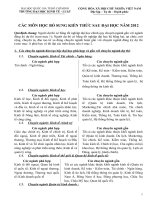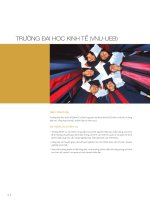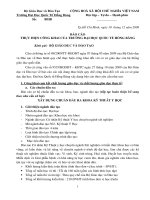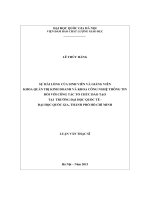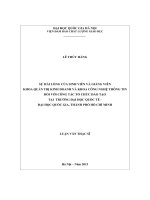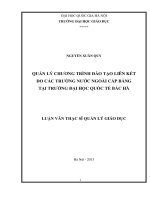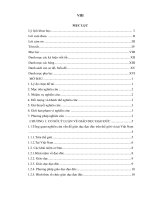Ebook Vietnam homestay operations manual - Trường Đại Học Quốc Tế Hồng Bàng
Bạn đang xem bản rút gọn của tài liệu. Xem và tải ngay bản đầy đủ của tài liệu tại đây (2.43 MB, 7 trang )
<span class='text_page_counter'>(1)</span><div class='page_container' data-page=1>
MINISTRY OF CULTURE, SPORTS AND TOURISM
VIETNAM NATIONAL ADMINISTRATION OF TOURISM
<b>ENVIRONMENTALLY AND SOCIALLY RESPONSIBLE TOURISM</b>
<b>CAPACITY DEVELOPMENT PROGRAMME FUNDED BY THE EUROPEAN UNION</b>
</div>
<span class='text_page_counter'>(2)</span><div class='page_container' data-page=2>
CONTENTS
<b>Environmentally and Socially Responsible Tourism Capacity Development Programme</b>
39A Ngo Quyen Street, Ha Noi, Vietnam
<b>Tel:</b> (84 4) 3734 9357 | <b>Fax:</b> (84 4) 3734 9359 | <b>Email:</b> | <b>Website:</b> www.esrt.vn
CONTENTS
INTRODUCTION 3
TOURISM AND HOMESTAYS IN VIETNAM 4
HYGIENE AND CARING FOR THE ENVIRONMENT 5
SAFETY AND SECURITY 6
CUSTOMER SERVICE 7
MAXIMISING SALES 9
MANAGING MONEY 11
LOW COST MARKETING 13
HOUSEKEEPING 15
FOOD AND BEVERAGE SERVICE 16
COOKERY 17
<b>© 2013 Environmentally and Socially Responsible Tourism Capacity Development Programme</b>
This publication has been produced with the assistance of the European Union funded Environmentally and Socially
Responsible Tourism Capacity Development Programme (ESRT).
The content of this publication is the sole responsibility of the ESRT programme and can in no way be taken to reflect
the views of the European Union. The European Union and ESRT do not guarantee the accuracy of the data included in
this publication and accept no responsibility for any consequence of their use.
</div>
<span class='text_page_counter'>(3)</span><div class='page_container' data-page=3>
INTRODUCTION
Tourism and
homestays in
Vietnam
The ESRT
programme
<b>INTENDED USE OF THE MANUAL</b>
The <i> Vietnam Homestay Operations Manual</i> has been
designed as a compendium to the homestay operator
training material developed by the EU-funded
High Impact Tourism Training Programme for the
Informal Sector (HITT) Vietnam supported by the
EU-funded Environmentally and Socially Responsible
Tourism Programme (ESRT). The manual provides an
overview of the key topics from the HITT homestay
operator training course including basic hospitality
skills such as customer service, housekeeping
and food and beverage service, through to small
business management skills such as basic marketing
and accounting. The manual may be of interest to
existing or potential homestay operators and staff
as well as practitioners and trainers working in
the field community based tourism and homestay
management.
1<sub> World Travel & Tourism Council (WTTC) 2013, </sub><i><sub>Travel & Tourism Economic Impact 2013: Vietnam</sub></i><sub>, WTTC, London, UK</sub>
VIETNAM HOMESTAY OPERATIONS MANUAL 3
INTRODUCTION
Tourism forms an important part of Vietnam’s economy, directly contributing 4.5 percent
to the country’s gross domestic production and directly supporting 1.8 million jobs or 3.8
percent of the total workforce in 2012. 1
Often found in the mountains north and central regions of Vietnam where many traditional
ethnic minority people live, the homestay experience normally combines basic family hosted
accommodation in a traditional house village with meals, a cultural performance, local tours
and the purchase of handicrafts.
While homestays are a niche within the broader accommodation sector in Vietnam, if
developed according to a market-based approach, homestays can be a viable livelihood
option / supplement to rural community members whose other accessible livelihood options
may be limited.
The European Union (EU) funded Environmentally and Socially Responsible Tourism Capacity
Development Programme (ESRT) is a sector capacity-building programme for stakeholders in
the Vietnam tourism sector. The Vietnam Homestay Operations Manual aims to help strengthen
capacity of homestay operators living in the remote and rural areas of Vietnam in order to
enhance their standard of homestay operation enhancing employment and income at the
local level.
Tourism and
homestays in
Vietnam
</div>
<span class='text_page_counter'>(4)</span><div class='page_container' data-page=4>
I
n order to be able to successfully operate your business it is important to understand the nature of the business youare in (the goods and services you produce), your customers (people who buy your products), the dynamics of the
industry within which you work (external organisations that affect the operation of your business) and understand the
potential positive and negative impacts of your business.
Tourism is the travel of people to countries or places
outside their usual environment for personal or business/
professional purposes.
The tourism industry is all businesses that directly
provide the goods or services to facilitate the business,
pleasure and leisure activities that take place away from
the home environment.
According to the Vietnam National Statistics Office, in
2012 most international tourists came from within the
region, with China, South Korea, Japan and Taiwan being
the most significant sources. Most Western tourists to
Vietnam come from the US, Australia and France. 2
International visitors to Vietnam come mainly for holidays
and leisure in order to take a break from work or study.
Visiting friends and family and business purposes is also
a popular option.
Tourists who visit a homestay are interested in
experiencing village life - culture and traditions of
local people, and enjoying the surrounding natural
environment that almost all tourists visiting homestays
have in common.
Tourists’ need a range of services while they are on
holiday such as:
<b>•</b> Transportation to get around
<b>•</b> Accommodation for overnight stays
<b>•</b> Food & drink for breakfast, lunch, dinner and snacks
<b>•</b> Things to see and do for relaxation, recreation and
entertainment
Banks, telecommunications, and safety and security are
also important.
The Vietnam government’s national standards (TCVN)
for homestays advise that homestays should provide
certain standards in the provision of facilities and
services to ensure tourists obtain a satisfactory homestay
experience. Key homestay facilities and standards
include:
<b>•</b> <b>Sleeping facilities</b> – A bedroom / guestroom (8-10
m2 in size), good ventilation, electricity, lighting, a fan,
single bed/s (0.9m x 2m in size) or double bed/s (1.5m
x 2m in size).
<b>•</b> <b>Washroom facilities</b> – A bathroom / shower and
toilet (3m2 in size, servicing a maximum of 5 guests
each), ceramic tiled walls and floor, lighting, shower
with hot water, wash basin, and toilet.
<b>•</b> <b>Skills and training</b> – Management staff should have
attended a training course in homestay management
except for people certified by an authorized tourism
training institution.
<b>What is tourism?</b>
<b>Key requirements for operating homestays in Vietnam</b>
2<sub> Vietnam General Statistics Office 2012, </sub><i><sub>International visitors to Vietnam in December and 12 months of 2012</sub></i><sub>, Available [online]: www.vietnamtourism.gov.vn/</sub>
english/index.php?cat=012041&itemid=6308, Accessed 27/08/2013
</div>
<span class='text_page_counter'>(5)</span><div class='page_container' data-page=5>
A clean and tidy homestay makes a good first impression.
Tourists also place great importance on the hygiene of
both service staff as well as the home living environment.
Good hygiene also reduces incidences of accidents, and
discourages pests and the spread of disease. In order to
keep your homestay clean and tidy:
<b>•</b> Put clothes and personal items away once they have
been used
Present a clean and inviting environment. Key
requirements include:
<b>•</b> Keep paths, walkways and drainage systems clean
and free from leaves and standing water
<b>•</b> Keep gardens tidy and free from weeds
Most homestay visitors are also interested in seeing the
surrounding natural environment and want to know
homestay operators are doing their bit to look after
it. The following basic principles should therefore be
followed:
<b>•</b> Use dustbins and follow good waste management
principles
Be a responsible homestay operator and minimise waste,
water and energy use:
<b>•</b> Employ good waste management principles and only
buy what you need, reuse and recycle waste where
possible, and dispose of anything remaining through
proper waste management processes.
<b>•</b> Save water by turning off taps immediately after use,
<b>•</b> Regularly maintain / fix anything broken
<b>•</b> Clear away unnecessary clutter
<b>•</b> Keep pets and animals out of the way
<b>•</b> Clean daily, particularly when guests are staying
<b>•</b> Keep bedding dry and clean
<b>•</b> Clean kitchen area every day
<b>•</b> Provide rubbish bins and empty the rubbish daily
<b>•</b> Clean up rubbish and animal droppings
<b>•</b> Keep water tanks clean and covered to prevent
insects, pests, and dead leaves from contaminating
the water
<b>•</b> Do not litter, especially along trails, in villages and
surrounding areas
<b>•</b> Keep local village clean and tidy
<b>•</b> Inform villagers about the importance of looking after
the environment
<b>•</b> Limit use of chemical fertilisers and harmful pesticides
fixing leaking taps and water pipes as soon as a leak
is identified and asking guests to use water wisely.
<b>•</b> Save electricity by switching off lights and electrical
appliances when they’re not in use and using low
wattage energy efficient lights.
<b>Homestay facility</b>
<b>Garden and grounds</b>
<b>Surrounding environment</b>
<b>Waste, water and energy</b>
Visitors have a basic expectation of hygienic and
cleanliness. Within the homestay hygiene refers to
cleanliness of the house and garden as well as the
cleanliness of the homestay family or service staff.
HYGIENE AND
CARING FOR THE
ENVIRONMENT
</div>
<span class='text_page_counter'>(6)</span><div class='page_container' data-page=6>
<b>Managing security issues</b>
Make plans to safeguard your own personal security and
safety as well as that of your guests from theft of property,
personal robbery, and incidents involving violence. Some
simple principles include:
<b>•</b> Provide a place to lock up personal belongings
<b>•</b> Provide good lighting inside and outside your
homestay
<b>•</b> Help guests out of if they find themselves in trouble
and the action does not pose any safety threat to
yourself
<b>•</b> Assist guests report serious security incidents to the
local authorities so they can make an insurance claim
<b>Managing safety issues</b>
Injuries that compromise personal safety can be caused
by animals, insects and plants or result from accidents
inter acting with the built environment, for example
falling through a broken stair. Reduce safety incidents
by:
<b>•</b> Alerting guests to known safety risks
<b>•</b> Restrain pets or animals
<b>•</b> Keep house, garden and grounds well maintained,
tidy and free from clutter
<b>•</b> Provide guests with mosquito nets
<b>•</b> Keep electrical appliances and sockets well
maintained
<b>•</b> Serve and consume alcohol responsibly
<b>•</b> Keep furniture well maintained
<b>Responding to emergencies</b>
It is normally possible to attend to simple guest injuries
such as minor cuts and scratches yourself, however if a
guest is badly hurt or injured they must go to a doctor as
quickly as possible. The key steps in emergency response
include:
<b>•</b> Determine the level of danger of the injury. Can
the injury be easily treated or is a nurse or doctor
required?
<b>•</b> Secure the guest and remove from the source
of injury (e.g. away from an electricity supply or
dangerous animal)
<b>•</b> Notify someone else of the situation and get further
assistance if required
<b>•</b> Call the emergency number
<b>•</b> Apply basic first-aid treatment
<b>•</b> Take the patient to the doctor or hospital if necessary
The response to a number of common emergency
situations in homestay environments is outlined below.
<b>INJURY</b> <b>EMERGENCY RESPONSE</b>
Burn Cool with ice or cold running water. Do not break blisters. Bandage loosely.
Dog bite Clean the wound with antiseptic, and cover with a band-aid or plaster. Take the victim to doctor for a tetanus
injection if needed.
Electrical
shock Turn off the power quickly. If needed, apply cardiopulmonary revival technique (blowing air into the mouth and pressing on the chest). Send the victim to a nearby medical centre once the heartbeat is restored and the victim is
breathing again.
Insect sting Remove the sting by scraping it away from the skin with the blade of a knife. Do not hold it between the fingers to
pull it out. Apply antihistamine ointment.
Snake bite If on a leg or arm, restrict the movement of that leg or arm by putting arm in sling or tying one leg to the other. Get
the victim to doctor immediately.
Sprain Bandage the sprained area to immobilise it. Elevate the leg if an ankle sprain. Apply ice to the injury to reduce
swelling.
SAFETY AND
SECURITY
</div>
<span class='text_page_counter'>(7)</span><div class='page_container' data-page=7>
If you do not know why a tourist has decided to visit your
homestay then it will be difficult to provide the necessary
requirements to meet his or her expectations and needs.
Whilst all tourists are unique, some common expectations
held by all are to be able to stay overnight in affordable,
clean, comfortable and secure accommodation, to
experience the traditional Vietnamese way of life, to
taste traditional Vietnamese food and drinks, to learn
about Vietnam by talking to a local, watching a cultural
performance, or viewing local arts and crafts, and to
experience Vietnam’s natural environment.
When an advanced booking is made it is important to
understand a little about your guests so you can prepare
your homestay bedding, food, and staffing accordingly.
Where possible find out:
<b>•</b> How many people are coming
<b>•</b> Gender and age group
<b>•</b> Nationalities
<b>•</b> Length of stay
<b>•</b> Additional services required (e.g. tours, cultural
performance, etc)
When setting up your homestay for guests the following
general standards apply:
<b>•</b> <b>Garden and grounds</b> – Kept neat and tidy, free of
rubbish, weeds and overgrown bushes or trees.
<b>•</b> <b>Living room</b> – Neat and tidy. Free of rubbish.
Furniture such as tables, chairs, sitting cushions and
cupboards should be well maintained and well laid
out. Floors should be swept or mopped. Household
items not needed by the guests should be stored out
of sight.
<b>•</b> <b>Sleeping area </b>– Neat and tidy, free of rubbish. Floors
should be swept or mopped and all surfaces dusted.
Bedding should be neatly laid out. Mosquito nets
should be provided. A place to store luggage and a
rubbish bin should be provided. Rooms should be
ventilated.
<b>•</b> <b>Kitchen</b> – Neat and tidy and free of rubbish. Floors
should be swept or mopped and all surfaces dusted.
Food, equipment and utensils should be clean and
neatly stored away. Provide a rubbish bin with a lid.
The room should be well ventilated.
<b>•</b> <b>Toilet & bathroom</b> – Neat and tidy and free of
rubbish. Personal family toiletry items should be
removed. Floors should not be slippery. Provide a
rubbish bin, sufficient toilet paper, and a water bucket
and scoop for non-Western toilets.
Preparing for your guests
CUSTOMER
SERVICE
Customer services are actions or activities
provided to meet customer expectations and
produce customer satisfaction. Homestay
customer service activities can be grouped
into four key areas: preparing for guests,
welcoming guests, interacting with guests, and
farewelling guests.
</div>
<!--links-->

